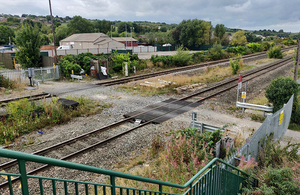Report 11/2019: Serious operational irregularity at Bagillt user worked crossing
RAIB has today released its report into a serious operational irregularity at Bagillt user worked crossing, Flintshire, 17 August 2018.

Image of Bagillt user worked crossing
Summary
At around 11:57 hrs on Friday 17 August 2018, a passenger train passed over Bagillt user worked level crossing, Flintshire, shortly after a very large road vehicle had crossed. Railway signals had not been set to stop trains from approaching the crossing. A person assisting the vehicle driver, who was walking back over the crossing to close the gates behind the vehicle, was alarmed to see the approaching train and ran off the crossing.
The vehicle driver’s assistant had telephoned the signaller and obtained his permission before crossing the railway, but the signaller had not stopped trains approaching when a large vehicle needed to cross the railway, as required by the Rule Book. The user had not told the signaller that the vehicle was large, as required by a sign displayed at the crossing. The signaller did not ask questions to establish the size of the vehicle, and did not know that most people using this crossing did so with heavy goods vehicles, although some Network Rail staff were aware of this. Network Rail was unaware that this exceptionally heavy vehicle, subject to special requirements when on public roads, used the crossing regularly.
Underlying factors relate to Network Rail’s processes for risk management at this type of level crossing. These did not provide railway staff or road users with a coherent and consistent process for deciding when a vehicle should be treated as ‘large’, and did not provide an effective interface between signallers, crossing users and railway staff responsible for liaison with users and inspecting level crossings. An observation identifies further shortcomings in the information provided to signallers.
Recommendations
The report contains one recommendation addressed to Network Rail, seeking improvements in its management processes for user worked crossings with telephones.
The report also contains two further observations. One, relating to how signallers decide when it is safe for users to cross the railway at level crossings, provides evidence supporting the need for Network Rail to complete implementation of a previous RAIB recommendation. The other notes poor application of safety critical communication protocols in some training material.
The RAIB has identified five learning points. Four relate to dealing with requests to cross the railway at user worked level crossings. These cover clear communication about the characteristics of road vehicles needing to cross the railway, the circumstances when signal protection is needed, making allowance for differing train speeds when deciding when it is safe for users to cross and achieving safety critical communication standards when speaking with members of the public. The final learning point relates to correct use of safety critical communication protocols in training material.
Notes to editors
- The sole purpose of RAIB investigations is to prevent future accidents and incidents and improve railway safety. RAIB does not establish blame, liability or carry out prosecutions.
- RAIB operates, as far as possible, in an open and transparent manner. While our investigations are completely independent of the railway industry, we do maintain close liaison with railway companies and if we discover matters that may affect the safety of the railway, we make sure that information about them is circulated to the right people as soon as possible, and certainly long before publication of our final report.
- For media enquiries, please call 01932 440015.
